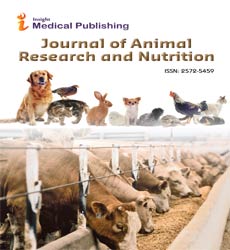Feeding Technologies and Circular Economy Solutions in Livestock Management
Giovanni Patil*
Department of Agriculture and Veterinary Sciences, University of Zimbabwe, Harare, Zimbabwe
Giovanni Patil*
1Department of Agriculture and Veterinary Sciences, University of Zimbabwe, Harare, Zimbabwe
- *Corresponding Author:
- Giovanni Patil,
Department of Agriculture and Veterinary Sciences, University of Zimbabwe, Harare, Zimbabwe
E-mail: patil_g@gmail.com
Received date: September 23, 2024, Manuscript No. IPJARN-24-19747; Editor assigned date: September 25, 2024, PreQC No. IPJARN-24-19747 (PQ); Reviewed date: October 09, 2024, QC No. IPJARN-24-19747; Revised date: October 10, 2024, Manuscript No. IPJARN-24-19747 (R); Published date: October 17, 2024, DOI: 10.36648/2572-5459.9.5.143
Citation: Patil G (2024) Feeding Technologies and Circular Economy Solutions in Livestock Management. J Anim Res Nutr Vol.9 No.5: 143.
Description
Precision feeding involves the use of technology and data to optimize the feeding process, reducing waste and improving feed efficiency. Sensors and automated systems can monitor an animal’s nutritional intake and health status, allowing farmers to tailor feed compositions to the specific needs of individual animals or groups. This minimizes overfeeding or underfeeding, reduces feed costs and enhances overall productivity while mitigating environmental impacts.
Livestock management practice
One of the most potential strategies for sustainable feed production is adopting circular economy principles. This approach involves recycling food waste and agricultural byproducts into animal feed. Food processing industries generate substantial quantities of by-products, including fruit and vegetable peels, brewers' grains and dairy by-products, which can be repurposed as nutritious animal feed. This practice reduces waste, lowers the demand for virgin feed resources and contributes to a more sustainable food system.
In the context of animal feed, ethical considerations are central to the discussion on animal welfare and sustainability. Livestock management practices have far-reaching implications for the animals themselves, as well as for ecosystems and human society. Poor feed quality and inadequate nutrition can lead to health problems in animals, impacting not only their well-being but also the safety and quality of animal-based products for human consumption.
One of the ethical dilemmas in animal feed is the use of growth-promoting additives, such as antibiotics and hormones. While these substances can improve productivity, their overuse raises concerns about animal welfare, the development of antibiotic-resistant bacteria and the safety of meat and dairy products. A move toward more natural, additive-free feeding practices would be a step in the right direction for animal welfare and public health.
Additionally, feed practices should be aligned with the animals' natural dietary preferences and needs. For example, ruminants like cows and sheep are adapted to graze on grass, but industrial farming practices often rely heavily on grain-based diets to maximize growth and production. This dietary shift can lead to digestive issues and other health problems for the animals, raising concerns about their welfare. In contrast, pasture-based feeding systems allow animals to express natural behaviors, contributing to better overall health and well-being.
The economic dimension of animal feed is multifaceted, surrounding both the costs of production and the impacts on global food security. Feed represents a significant portion of the costs in animal production systems, influencing the price of animal products such as meat, dairy and eggs. Rising feed prices, driven by fluctuations in the global market for crops like soy and maize, can lead to higher costs for farmers and consumers alike.
Livestock production
Moreover, the competition between animal feed and human food crops poses a challenge to global food security. As more land and resources are dedicated to growing feed crops, the availability of food for direct human consumption can be constrained. This issue is particularly acute in developing countries, where access to food is already limited. Balancing the needs of livestock with those of human populations will require careful consideration of agricultural policies, land use and resource allocation.
Animal feed is a fundamental of livestock production, but its role in environmental sustainability, animal welfare and global food security cannot be overlooked. As the world faces growing challenges related to climate change, resource scarcity and population growth, the feed industry must adapt to meet these demands responsibly. Innovations in alternative feed sources, precision feeding and circular economy practices offer promising pathways to a more sustainable and ethical future for animal feed. However, the success of these efforts will depend on collaboration across the agricultural, scientific and policy sectors, with a commitment to improving both the efficiency and the ethics of livestock management.

Open Access Journals
- Aquaculture & Veterinary Science
- Chemistry & Chemical Sciences
- Clinical Sciences
- Engineering
- General Science
- Genetics & Molecular Biology
- Health Care & Nursing
- Immunology & Microbiology
- Materials Science
- Mathematics & Physics
- Medical Sciences
- Neurology & Psychiatry
- Oncology & Cancer Science
- Pharmaceutical Sciences
